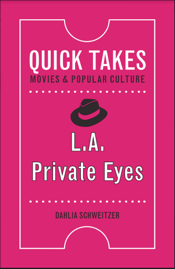
About Dahlia
DAHLIA SCHWEITZER is a pop culture critic, writer, and professor. Described by Vogue as “sexy, rebellious, and cool,” Schweitzer writes about film, television, music, gender, identity, and everything in between. She studied at Wesleyan University, lived and worked in New York City and Berlin, and completed her MA and PhD at the Art Center College of Design and UCLA. She is currently chair of the Film and Media department at the Fashion Institute of Technology in New York City.
In addition to her books, Dahlia has essays in publications including Cinema Journal, Journal of Popular Film and Television, Hyperallergic, Jump Cut, Quarterly Review of Film and Video, and The Journal of Popular Culture. She has also released several albums of electronic music, including Plastique and Original Pickup.

Professor
As a professor of film and media studies, Dahlia exposes her students to a variety of theoretical approaches and cinematic techniques, asking them to approach both with analytical inquisitiveness. Her aim is to pass her own curiosity on to her students, encouraging them to think across their classes and experiences to create intellectual connections between course materials and the world in which they live. She strives to remind her students that the loudest voice is not necessarily correct, and in so doing, helps them find their own.

Media Critic
Declared “one of the world’s leading analysts of popular culture” by renowned author Toby Miller, Dahlia writes about film, television, music, gender, identity, and everything in between. Her work can be found across mainstream, academic, and emergent channels in both long and short form. Repeatedly drawn to popular culture, Dahlia loves to analyze and unpack cultural artifacts in order to explore how they reflect social and historical issues, as well as looking at how they reinforce or interrogate common cultural assumptions.

Author
Dahlia has written numerous books exploring aspects of film and television. Regardless of the topic—serial killers, private detectives, or even zombies—all of her writing engages directly with questions of self versus other, private versus public space, examining depictions of gender, identity, and race. She traces how these depictions evolve and examines what they mean about our changing world. In her latest project, Dahlia explores the ways haunted homes have become a venue for dramatizing anxieties about family, gender, race, and economic collapse.
Blog
Just Some Facts (About Israel and the Myth of Apartheid)
This post is not meant to declare that any one people is "good" or "bad." I've repeatedly tried to move away from such simplistic binaries. The simple purpose of this post is to discredit some of the claims that Israel is an apartheid country. Many of these facts are overlooked--or not known--and so I wanted to highlight them. I have obtained some facts from the Jewish Virtual Library, which is a source of easy-to-access and reliable data, in case any one wants further information. In brief:...
Forget about Your Feelings. Look at the Facts.
Okay, everyone. I think it's time to review the current insult "snowflake" (with thanks to Dana Schwartz) -- There is not a single political point a liberal can make on the Internet for which “You triggered, snowflake?” cannot be the comeback. It’s purpose is dismissing liberalism as something effeminate, and also infantile, an outgrowth of the lessons you were taught in kindergarten. “Sharing is caring”? Communism. “Feelings are good”? Facts over feelings. “Everyone is special and unique”?...
Why Are White Women Unhappy?
The New York Times recently published an article by Benedict Carey and Robert Gebeloff with the dramatic headline: "Many People Taking Antidepressants Discover They Cannot Quit." Carey and Gebeloff warn of the withdrawal symptoms that unexpectedly cripple users struggling to wean themselves off their antidepressants, describing "brain zaps" and insomnia, loss of balance and nausea. Carey and Gebeloff also warn of the unexpected side-effects of antidepressants: emotional numbing, erectile...




